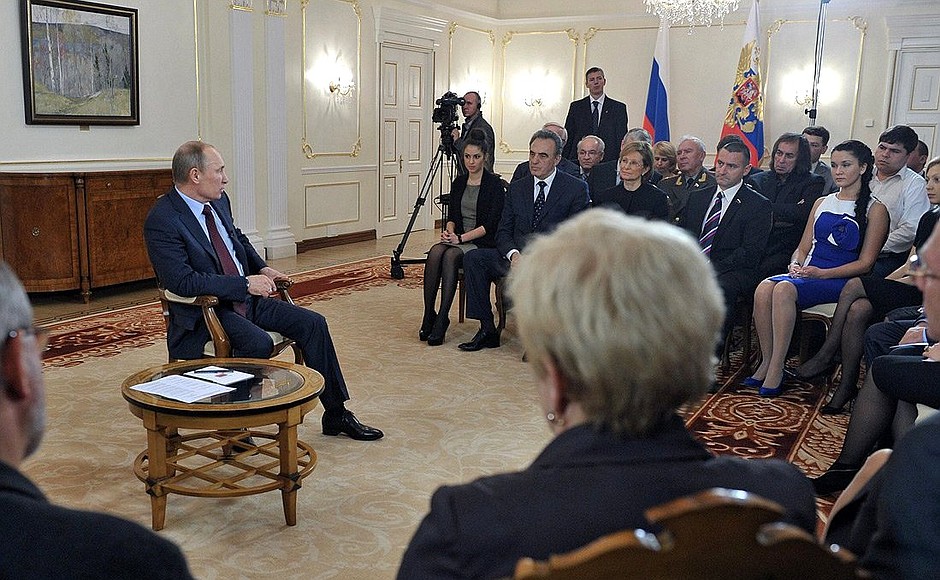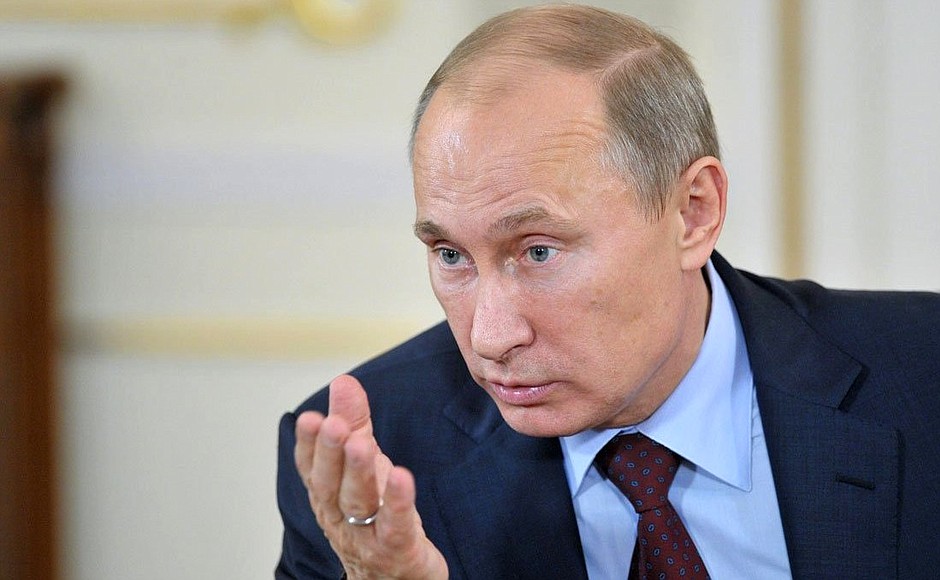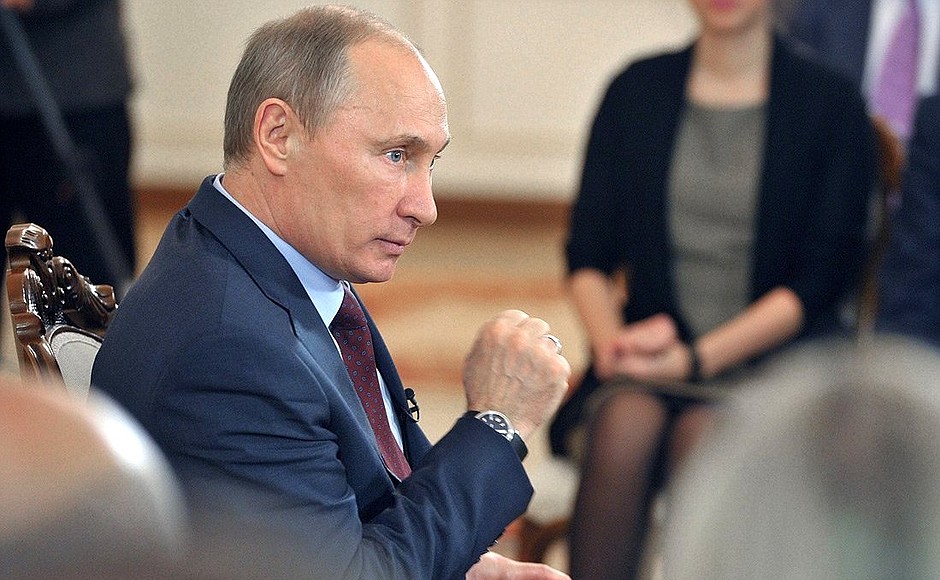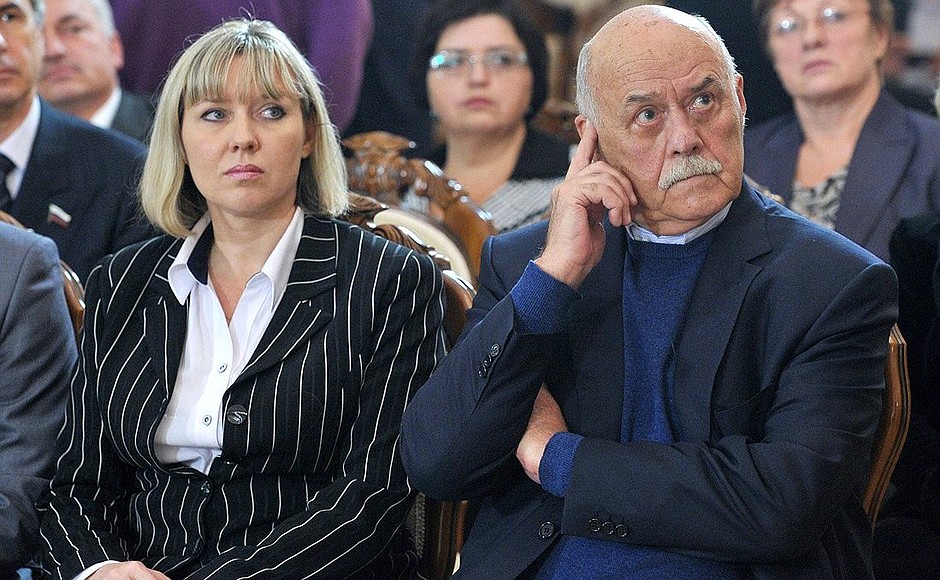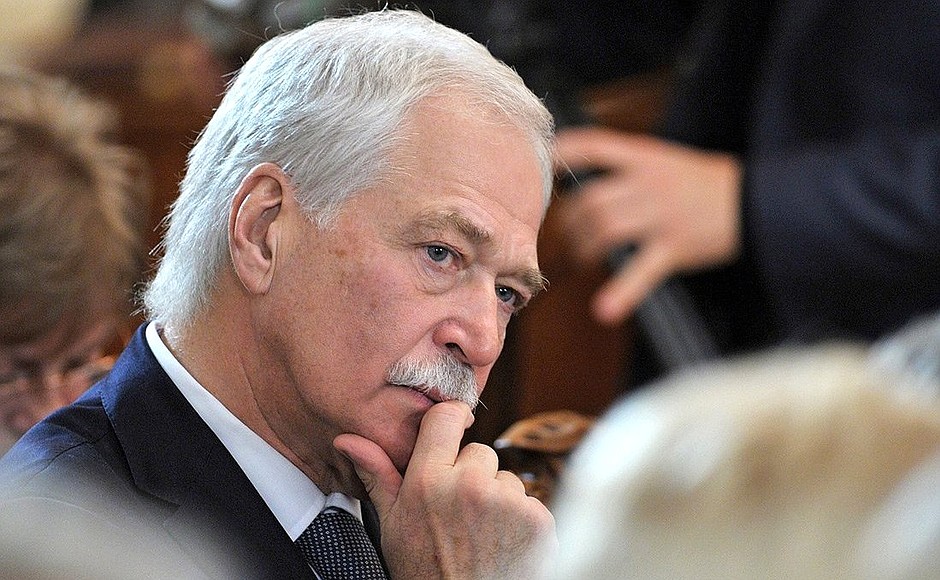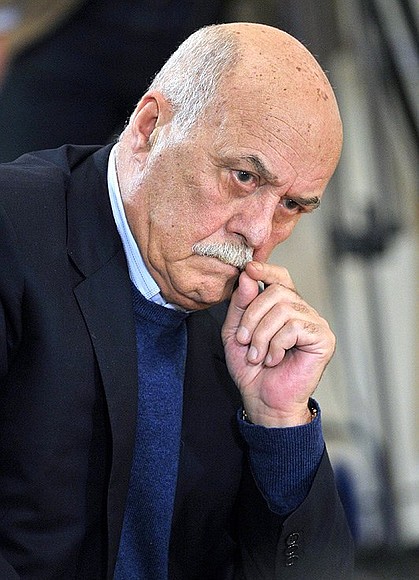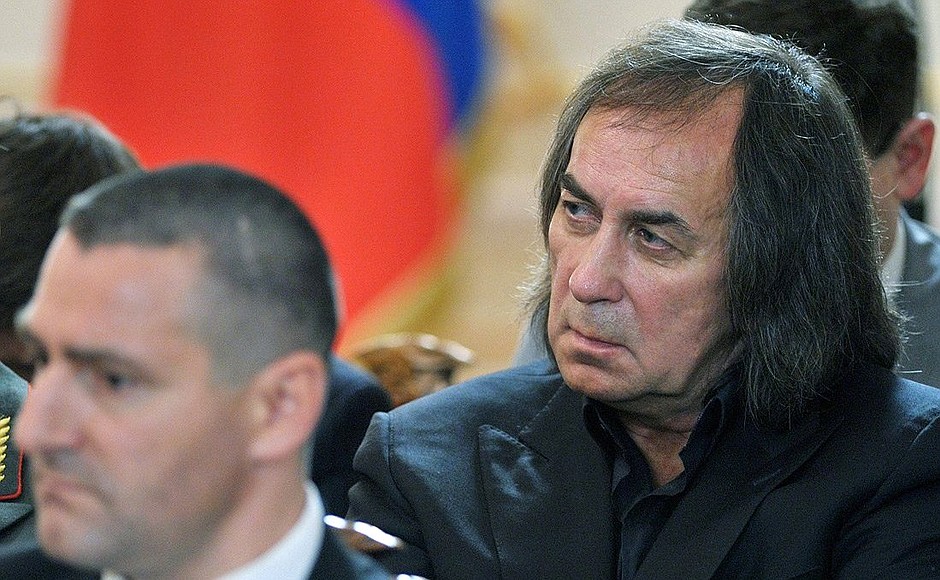The Russian Popular Front was established on Vladimir Putin's initiative in 2011 as a voluntary association of public organisations, political parties and members of the public. One of the Front’s goals is to create a new opportunity for civil society to take an active part in the Government's most important decisions.
* * *
Excerpts from transcript of meeting with core members of the Russian Popular Front
President of Russia Vladimir Putin: Good afternoon, friends, colleagues,
I am very pleased that we have such a representative gathering today, including members of various public organisations, trade unions, political parties and youth movements.
During the presidential election campaign and immediately afterwards we said that we must continue our efforts. There were many discussions about the objectives the RPF was created to pursue and whether it is just a campaign tool. Indeed, it did serve as a political campaign tool, but that was not its only purpose. My original understanding was that if we succeed in creating a broad public coalition, and that is exactly what the Popular Front has become, then it would simply be wrong and wasteful not to let it get involved in social processes. In fact, everything that has been done in Moscow and around the country was achieved with the direct involvement of work teams, the people, our citizens, and it is a very good feedback tool that lets us know what is being done and how successfully in different parts of the country.
To begin with, I want to thank you: many of you present here took an active part in the preparation of the national development programme. You may have noticed that my first executive orders as President of the Russian Federation dated May 7, 2012 deal with many issues that you formulated. They are all identified there, and not just identified but the executive orders set the deadlines and outline the means we will use to address the challenges facing our country.
This prompts a very simple and logical conclusion: if the people represented in the Russian Popular Front formulated the national development programme, then you should have the opportunity to oversee how the targets you have set are being met. This is a very important part of any political initiative, and so, as we agreed, I suggested that we meet to discuss what we can do in the future and in what format.
”The Russia Popular Front is a broad public coalition, then as soon as we establish a political party, the scope of its activities will be limited. Right now the Russian Popular Front can involve various public organisations in its work.“
The first task, which I talked about in the past and would like to go back to now, is control over the execution. The tasks themselves have been formalised in the plans and specific documents, including the Presidential executive orders, but we are all adults here – some of us are older, some younger, but we are all adults – and we understand that life is full of problems and surprises, and there is always need for adjustments. Therefore, as we implement any initiative, tackle any challenge facing the nation, there are always some details that we must respond to quickly but efficiently and competently.
Therefore, the second task, which is directly linked to the first one, is to respond to everything that happens in real life, so that we can quickly make amendments, perhaps even change our plans and priorities.
Many of you asked at our previous meetings: What should be the format of the Popular Front’s work? Some colleagues suggested that we should establish a political party, but I said that perhaps it may become an option in the future but at this point it would limit the scope of our activities. Why? Because if the Russia Popular Front is a broad public coalition, then as soon as we establish a political party, the scope of its activities will be limited. Right now the Russian Popular Front can involve various public organisations in its work, including different parties, not only United Russia or Patriots of Russia but any political parties that share our views on national development.
This will make the organisation more vibrant, because when it includes people who share strategic objectives but have different ideas about how to achieve these goals, it allows you to launch a discussion on any vital issue, and that creates an opportunity to find the most effective solutions to the challenges faced by our country.
Therefore, I would like to suggest that you hold a founding congress and establish the nationwide public organisation Russian Popular Front, which will involve public organisations, political parties and private individuals in its activities. Don’t put it off for too long; you should hold the congress sometime in the next few months – it would probably be best to do it in the spring.
I propose that we consider this together today.
I will finish my monologue so that we can talk informally about any issues that may arise. Go ahead, please.
* * *
Vladimir Putin: What we are seeing now is precisely the process we spoke about and aimed for: using United Russia’s instruments we are drawing in a broad range of people who are not themselves United Russia party members but share our common values about the country’s development and about work in the regional and federal political organisations.
One more very important thing that I think has principle significance is that, as we see here, we have young people who are just starting out on their road in life, and we have people who have already accomplished much in their various fields. I am friends with many of them and I see how they go about building their lives. Successful people only look forward, never look back. We should make use of the foundations that others laid in the years past, but we must keep our gaze set forward, take as our reference only the very best examples and practice, and stay one step ahead at all times. Only then will we be successful.
Alexei Lavrinenko (collective farm chairman, Stavropol Territory): I hope that our discussion will result in a decision on how we, the Popular Front, will supervise all that we have brought together. If we just make it an updated version of ‘people’s control’ this will be just more effort in vain, but if we set up a body that really does help, advise, and contribute to finding new reserves, then we will get results.
”Using United Russia’s instruments we are drawing in a broad range of people who are not themselves United Russia party members but share our common values about the country’s development and about work in the regional and federal political organisations.“
We do not need a party but a public movement. Seeing the election results and the support for the Popular Front, we realise that the public has confidence in us, in you, and believes that we will indeed make our lives better. My only desire is for us all to live in happiness, neither rich nor poor, but simply happy in a normal happy country, and we must do everything we possibly can to achieve this.
Vladimir Putin: You raised a very important practical issue just now, namely, how to carry out this public supervision. You are right; we do not need any new versions of ‘people’s control’. We need people to oversee not just what we say and what gets written in our documents, but, as I said, we also need people to give us real feedback about what is happening in the country, make adjustments to plans, and perhaps set new tasks in line with the constantly changing circumstances. Life is complex and diverse, and we therefore need a mechanism that works effectively, but the question is how to establish it and what this will require?
The first thought that comes to mind is to have the National Popular Front’s various component political groups work to get their representatives into the government bodies, into executive and legislative bodies (the legislative assemblies), and perhaps propose them for work in the executive bodies. This alone is not enough though, and we will have to reflect on other possible mechanisms and instruments. This will be one of the subjects of discussion for the founding congress.
* * *
Vladimir Putin (replying to a question about direct gubernatorial elections from Aslambek Paskachev, chairman of the public movement Russian Congress of the Peoples of the Caucasus): You raised one of the key issues of our political life today. To speak frankly and openly, the previous system of appointing regional heads was dictated above all by the problems with secret ballot voting in the North Caucasus republics. This was related to my personal experience of the serious situation in 1999, when Karachayevo-Circassia held its first election, which was immediately followed by shooting and victims the very first night.
Voting in these republics takes place along ethnic lines. One ethnic group is bigger than the others. Unfortunately, we have not yet reached the stage where people vote based on personal and professional qualities and abstract themselves from the ethnic issue. They vote for personal and professional qualities, so long as the candidate is from their own ethnic group. This is the reality of our life and traditions, and we have to respect this. It is important to remember this. You cannot just ignore it and tell people, ‘No, you should do things as we dictate’. We are to show respect for even the smallest ethnic groups and respect their traditions and culture. At the same time, we must do this in a way that guarantees the rights of every ethnic group, so that people know that they have the right to take part in the process and that their vote really does matter.
When I say that their vote really does matter, I think you understand what I am getting at. As I said, if you have different ethnic groups of different sizes and hold simple direct secret ballot elections, you will always end up with people from one and the same ethnic group elected, and the other groups will not be happy. This is something we must take into account and we must respect the rights of even the smallest groups.
The problem is finding the right formula. This is not an easy task at all.
In Daghestan, for example, there was a system operating de-facto in violation of the laws and Constitution. There was a quota system designed to accommodate the various ethnic and religious groups. If the president was an Avar, for example, the prime minister would automatically be a Dargwa, and the speaker of the parliament would be a Kumyk. There was a rotation system in place. This is all a complicated thing, but that was the system that the people there came up with. You cannot simply come in and dictate from above here.
But at the same time – and it is important to remember this — we also cannot have one set of rules for one region and other rules in other regions, because this would divide our common political space and our country would cease to be a single unified state. This would be unacceptable.
* * *
Vladimir Putin: All the same our society is evolving, becoming stronger and more dynamic simultaneously. And I think it is right not only to give citizens the right to elect their regional leaders, but to shift the responsibility for that choice to citizens themselves. This is a very important thing for cultivating a sense of responsibility to one’s region, country, the future of the nation and our children. This responsibility does not emerge immediately. Some people do not care while some don't even think about it, but if the responsibility is not delegated, it will never be accepted.
Mikhail Leontyev (journalist, TV anchor): It would be easier to elect senators directly. Why should they not be elected?
Vladimir Putin: This is also something that must come. So I still think that we did the right thing by changing to a system in which regional leaders are elected directly. Another factor is that our country is complex, and finding a formula that would be applicable everywhere yet take into account the nuances of each particular region is a difficult task. Let's think about this and look for an answer together.
* * *
Vladimir Putin (in answer to the question of State Duma deputy from Stavropol Territory, Olga Timofeeva, regarding the ban on headscarves in a school in the Territory): We must always treat people’s religious convictions with great respect. This is very important and should be reflected in all aspects of state policy, in everything. That is the first thing.
Second. We live in a secular state and this must be our starting point. We also have a multi-religious country, but the general rule of a secular country must apply: our church and our state are separate. This is a very important aspect of our lives today and in the future.
”Our society is evolving, becoming stronger and more dynamic simultaneously. And I think it is right not only to give citizens the right to elect their regional leaders, but to shift the responsibility for that choice to citizens themselves. This is a very important thing for cultivating a sense of responsibility to one’s region, country, the future of the nation and our children. This responsibility does not emerge immediately.“
And the third thing. We should look at how our neighbours, for example European countries, resolve these problems and everything will become clear. But everything should be done calmly, in an acceptable fashion, one that does not offend anyone and in dialogue with representatives of various faiths.
I've seen how some respected people, including in Islamic circles, speak and talk about the value of the fact that we live in a secular state. Why? Because if we were to move in some other direction then – please pay your attention to the fact that over 80 percent of our people formally or informally self-identify as Orthodox – then we should be aware that if not all are equal and do not acknowledge the secularism of our country, then the representatives of other, even major traditional religions will feel aggrieved in one way or another in the near future. It is better that all feel equal. This is the first thing.
And the second: I would suggest — but the specific suggestions should be generated at the regional level and perhaps even the municipal one – introducing a school uniform. Not necessarily as in Soviet times when there was one for the entire country, but it is quite possible for the regions to introduce a common school uniform. So the problem is not only related to religious affiliation or visible religious attributes. There are also more mundane things: in a market society people live in different ways and egalitarianism is not the norm. Hence it's probably not very nice when some kids come to school dressed very fashionably – to put it diplomatically – while others are dressed very modestly, again speaking diplomatically.
After all, no one should feel like a second class citizen in such [school] environment. It would certainly be better if regions and municipalities were to consider introducing common standards for school clothes. There is nothing wrong about it. In my view, an obligatory uniform is a very good example of a practice that was conducted in the Soviet Union and is taking place now in neighbouring countries, and even in a very self-respecting and internationally recognised educational institutions, including universities. Is that a bad thing? No. On the contrary, it’s a tradition, and a good one.
Now regarding the relationship between officials and the Popular Front. We should in no way bureaucratize the Popular Front. Still, it must use all available channels to communicate with various parties, including United Russia, and the executive authorities, while preventing anyone from imposing their will on the association.
Through our direct communication we all know how it should be: you formulate what you consider to be the country’s most important challenges, and together we look for ways to address them. Of course many people will want to participate in this effort, but it must be a dynamic effort and people must join [the Popular Front] motivated for a dynamic and positive process, and not to solve personal or corporate issues.
* * *
Vladimir Putin: We need modern, democratic tools, mechanisms of interaction with various social strata and groups, and to ensure that these communication channels work in both directions.
First, we created business associations, and some of their representatives are present here today. Work can proceed through them, because we maintain regular contacts with these public and business organisations.
Virtually no important Government decisions or policies concerning economic development are adopted without their participation. But these are associations of entrepreneurs and their number may not grow forever since that would be counter-productive; it would simply be impossible to meet with all of them. This is the first thing.
Next is the fact that, despite the threat posed by the increasing number of such organisations, we have recently created one more: the Agency for Strategic Initiatives (ASI), where a lot of young people participate.
Within the Russian Popular Front we can and should devote enough attention to our economic development. But in my opinion, this should consist not so much of supporting some specific businesses, but rather setting general goals. We should structure such a communication mechanism which will allow us to hear the majority of people who work in each particular field so that we take their views into account.
* * *
Vladimir Putin: I think that this is one of the purposes of the Russian Popular Front: to prepare national solutions, solutions suitable to be deployed on a national scale, and of course to make a very important preliminary assessment of what policy might be adopted. Public opinion is very important for that.
”This is one of the purposes of the Russian Popular Front: to prepare national solutions, solutions suitable to be deployed on a national scale, and of course to make a very important preliminary assessment of what policy might be adopted. Public opinion is very important for that.“
If we can arrange to get to know public opinion through the channels of the Russian Popular Front this will be very useful.
* * *
Vladimir Putin: Regarding pension reform, a very sensitive and very important issue, with both social and economic aspects. Of course it would be useful for us to discuss such things at a Popular Front meeting as well as elsewhere. But the Popular Front has not yet taken shape as a non-governmental organisation, and failing that it is difficult to identify all of the problems that our country faces. In that case we are to return to these formats, and then to form quite a professional so-called platform to discuss specific issues.
Why? Because I understand that when it comes to rates and social taxes, especially taxes paid by hazardous industries, then if the burden on such businesses increases, businesses certainly do not like this. So within the Popular Front there should be a decision made based on both professional and public opinions, namely, if we protect the interests of the business community and do not raise taxes, then how are we going to support the growing number of pensioners in the future?
Some people, including our opponents, say: ”There is only one way to finance this [social commitment], namely to increase the retirement age for both women and men“. This is a very sensitive issue, requiring accurate and professional approach. So within the Popular Front we could engage in a broad discussion and see that, yes, such and such a proposal comes from this community, and that one from a different social group, and this one from workers; so then we could bring all the ideas together and find a compromise which would not hamper the country's development while offering a sustainable, self-sufficing, efficient pension system, one that does not undermine the economy and guarantees citizens’ pension rights.
* * *
Vladimir Putin: We will not meet often, but we will do so regularly, especially if we are concerned with some issue involving how our activities are structured. Perhaps we shall meet to discuss certain topics. Then the discussions and the steps we take following our discussions will be even more specific, more effective, and have better chances of being implemented. But what we did up until now was also great because many things are being implemented, and some have been incorporated in major documents as programmes for immediate and strategic goals, which is very important for our country.
I want to thank you for this.
